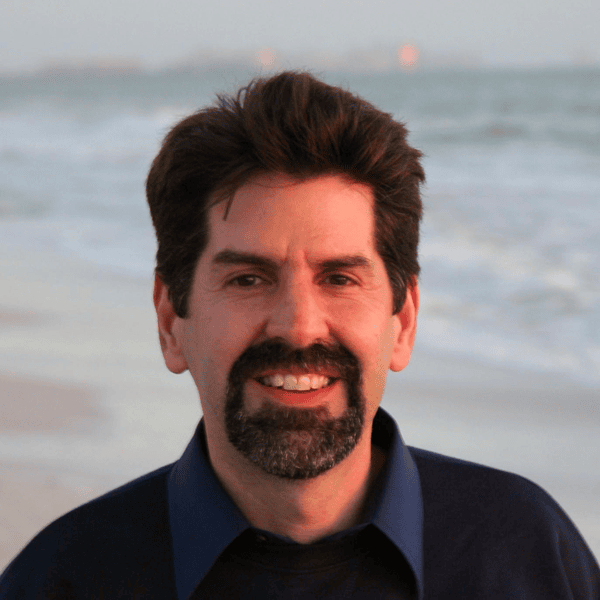A Report to the American Historical Association
Authors: L. Maren Wood and Robert B. Townshend

A visualization of the job titles held by 2,500 history PhDs
Introduction
Earning a doctoral degree in history presents a range of choices, starting with questions about where and what to study, and how to pay for the effort. Too often those choices have to be made with a significant amount of guesswork as to their potential outcomes. As part of the American Historical Association’s assessment of careers for history PhDs, the authors of this study undertook a detailed analysis of the current employment held by 2,500 history PhDs, all of whom earned their degrees between 1998 and 2009.1 In brief, we found that:
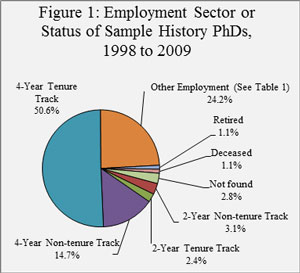 The overall employment rate for history PhDs was exceptionally high: only two people in the sample appeared unemployed, and none of them occupied the positions that often serve as punch lines for jokes about humanities PhDs—as baristas or short order cooks.
The overall employment rate for history PhDs was exceptionally high: only two people in the sample appeared unemployed, and none of them occupied the positions that often serve as punch lines for jokes about humanities PhDs—as baristas or short order cooks.- Just over half of the PhDs in our sample—50.6 percent—were employed on the tenure track at a four-year institution, and another 2.4 percent held tenure-track positions at two-year colleges (Figure 1).
- Specialists in US history were nearly 25 percent less likely to be employed on the tenure track than were specialists in other fields, but significantly more likely to be employed in history work outside the professoriate.
- Receiving a PhD from a top-ranked institution improved the odds of making it onto the tenure track at a research university.
- Gender played little role in employment patterns across particular professions and industries.
- Nearly two-thirds of the PhDs in academic positions remained in or near the region in which they earned their degrees, but faculty who remained in the same region as their doctoral studies were significantly more likely to be employed off the tenure track.
Our findings can only show a snapshot of employment at one moment in time, clarifying the recent shape of the job market for history PhDs, and providing guidance to doctoral programs, graduate students, and newly minted PhDs pondering their futures.
Research Methodology
To identify the career paths of recent history PhDs, the AHA hired Maren Wood (Lilli Research Group) to track down the current employment of a random sample of 2,500 PhDs culled from a total of 10,976 history dissertations reported to the AHA’s Directory of History Departments and Historical Organizations from May 1998 through August 2009. The AHA’s Directory Editor, Liz Townsend, compared the data to employment information in the AHA Directory—which lists academic faculty—and the Association’s membership lists, and Wood used publicly available information on the Internet. Data was collected during February and March of 2013, and reviewed in June and July. Together, AHA staff and Maren Wood identified current employment or status information, as of spring 2013, on all but 70 members of the sample group.
We located people through digital research using publicly available data, most often gleaning a person’s employment information from university, company, or organization websites and directories. For stay-at-home parents and those who had retired, information was found through volunteer organizations, Facebook, newspaper stories, and personal blogs. We supplemented this data with academic and government conference programs and publications. We made limited use of LinkedIn and departmental newsletters; these are good places to start, but self-titled employment may differ from organization or university categories. For example, an adjunct faculty member identified as a “professor” on LinkedIn may not be employed as full-time, permanent faculty at their institution.
For each person in our sample, we collected an employer name and job title as described by the university, organization, or business, and used this information to categorize people into career sectors used by the AHA in previous studies. For the purposes of identifying the status of history doctorates in relation to society as a whole, it made sense to use place of employment as a primary variable: we wanted to know where history PhDs are working. But we also wanted to know what they are doing, and to get at this dimension, we looked at the titles and functions of people within their organizations.
Three categories may require further explanation:
- Higher education administration includes only those who are primarily administrators; tenured faculty who have taken on additional administrative positions are categorized as tenured faculty; university librarians are categorized under “Library/Museum/Archive.”
- Library/Museum/Archive includes people who work in federal, state, and local government; private museums and archives; and colleges and universities. We tabulated this category separately—regardless of the institution’s placement in other academic or governmental sectors—because it is commonly assumed to be an area where history PhDs can find employment.
- Government includes any person employed in a federal, state, or local government agency. These include program directors, managers, researchers, diplomats, military personnel, and politicians. Excluded from “government” are those working at federal and state libraries, museums, and archives, because we wanted to test the assumption that history PhDs can find employment in these institutions. Thus, we categorized someone working at the National Archives under Library/Museum/Archive.
From the data gathered, we then imputed field specializations for the authors of each dissertation using their titles, advisor’s field of specialization, and area of expertise reported in their current employment. Additional demographic information on each PhD’s doctoral program and academic employer was then added from the National Research Council’s A Data-Based Assessment of Research-Doctorate Programs in the United States (2011), and the Department of Education’s Integrated Postsecondary Education Data System’s institutional characteristics data file.
A small number of the PhD recipients surveyed (just 1.1 percent of the total sample) had already retired, indicating that they earned the degree as a late-in-life avocational project, in most cases at non-elite public universities. Finally, a small proportion of PhDs (1.2 percent) suffered some form of deep personal misfortune (either death or incarceration).
Careers in and beyond the Professoriate
Careers in the Professoriate
Numerous studies over the past two decades have found around 70.0 percent of history PhDs envisioning careers in the professoriate, roughly the same number as went on to find employment there.2 In addition to the 53.0 percent of history PhDs in the sample with tenure track positions at two- and four-year institutions, 17.8 percent found faculty positions off the tenure track (14.7 percent of the total sample at four-year institutions, and 3.1 percent at two-year colleges). Another 0.4 percent of the sample found employment at for-profit colleges.
Among PhDs found on the tenure track, 43.1 percent had reached the rank of associate professor, and another 10.5 percent were full professors. For those who had received their degree more than seven years ago, we found 68.9 percent at the rank of associate or full professor, while among those who had received degrees within the past seven years, 84.3 percent were assistant professors.
Alongside faculty positions, another 3.2 percent of the sample’s PhDs found employment in positions as academic administrators without significant teaching responsibilities, and 1.2 percent in other positions at colleges and universities (primarily in libraries or archives). Viewed by the most expansive measure, 72.5 percent of history PhDs obtained employment in some capacity at postsecondary institutions.
This study is the first since 1995 to systematically identify the employment of a large cohort of history PhDs. In the earlier study (a survey of history PhDs under the age of 75), 64.6 percent of respondents reported finding employment at four-year colleges and universities, and another 6.4 percent reported positions at two-year institutions.3 Unfortunately, the 1995 study did not distinguish between tenure-track, adjunct, and administrative positions, though 21.9 percent of the history PhDs employed in academia reported not being eligible for tenure (as compared to 29.7 percent of the PhDs employed at colleges and universities in the present sample).
Please note that the large portion of history PhDs recorded in the non-tenure-track category in our study should not be taken as the number of people working primarily as contingent faculty. While this was the only employment discovered by our canvass, many of the history PhDs recorded in that category only showed up as teaching one or two courses during the previous year. For comparison, a recent survey of part-time history faculty found nearly a quarter teaching one or more course alongside a separate full-time job.4 Thus, some of the individuals categorized as non-tenure-track faculty may also be working in another sector.
Careers beyond the Professoriate
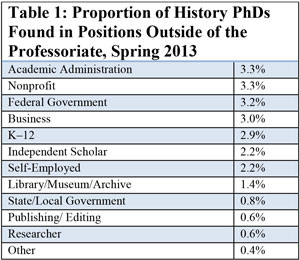 Among those employed outside of postsecondary teaching, the PhDs in our sample turned up in a wide array of positions—ranging from government offices and libraries to publishing houses and law firms (Table 1).
Among those employed outside of postsecondary teaching, the PhDs in our sample turned up in a wide array of positions—ranging from government offices and libraries to publishing houses and law firms (Table 1).
Four percent of the sample found positions in government at the federal, state, or local level. Managers, analysts, and related jobs in the nonprofit and business sectors accounted for 3.3 and 3.0 percent, respectively. Another 2.9 percent found employment in K–12 teaching; 2.1 percent became independent scholars; and 2.2 percent were self-employed in some other capacity.
Libraries, museums, and archives (tabulated separately from the categories above, even where the employing institution fit under one of the other rubrics) employed another 1.4 percent of the sample. While these institutions are often viewed as career paths for history PhDs, it should be noted that of the 32 people found in this category, at least 12 had also earned MIS or MLS degrees.
In the 1995 study, 27.5 percent of history PhDs under the age of 75 reported employment outside of academia, primarily in the nonprofit sector (5.7 percent), government (5.2 percent), or K–12 teaching (4.1 percent).
Viewed apart from the employing institution, 7.0 percent of history PhDs in the sample could be identified as finding employment in positions that clearly fit under the traditional label of “public history” (which is to say, employment in history work outside of academia). Though a separate survey found public history increasingly feminized in comparison to the discipline as a whole (nearly two-thirds of respondents in a recent survey of self-identified “public historians” were women), the same proportion of male and female history PhDs in our sample found public history jobs.5
Notably, a portion of graduates in the sample built their own paths into history employment. At least a half dozen of the PhDs founded a history-related consulting or research firm, and another 57 (2.3 percent of the sample) worked in various self-employed capacities, though it was not always clear how closely their research work actually tied to history.
Regardless of the employment sector or status, we found evidence that 75 percent of PhDs in the sample had worked in some capacity as historians—either as teachers or authors of history articles and books—during the past five years. Notably, remarkably little difference appeared across the different types and rankings of PhD programs on this result. Still, the result merits one caveat: some of this activity consisted of a single publication, which may have been the remnant of doctoral research, and therefore never to be followed by another publication.
Evidence of Change in the Job Market
This study can only provide a snapshot of the employment picture at one moment in time. But by breaking the sample into three 4-year groupings, based on the academic years in which the sample’s PhDs received their degrees, our findings suggest some of the changes in employment prospects and the job market over the past 15 years.
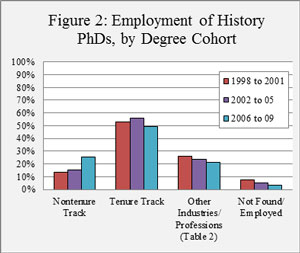 Colleges and universities employed 53.1 percent of the cohort that earned their degrees from 1998 to 2001 as tenured or tenure-track faculty, and another 13.5 percent as non-tenure-track faculty (Figure 2). For the 2002 through 2005 cohort, who graduated during a period when job advertisements were generally rising, 56.0 percent found employment on the tenure track; another 15.1 percent remained off the tenure track. Among those with PhDs earned from 2006 through 2009, 49.5 percent were on the tenure track; another 25.6 percent were employed in non-tenure-track positions.
Colleges and universities employed 53.1 percent of the cohort that earned their degrees from 1998 to 2001 as tenured or tenure-track faculty, and another 13.5 percent as non-tenure-track faculty (Figure 2). For the 2002 through 2005 cohort, who graduated during a period when job advertisements were generally rising, 56.0 percent found employment on the tenure track; another 15.1 percent remained off the tenure track. Among those with PhDs earned from 2006 through 2009, 49.5 percent were on the tenure track; another 25.6 percent were employed in non-tenure-track positions.
It is difficult to say how the comparatively high proportion of non-tenure-track faculty found in the most recent cohort might compare to a “normal” job market, unencumbered by the budget cuts and hiring freezes of the recent recession. Nevertheless, the fact that 13.5 percent of the earliest cohort still appeared to be employed primarily in adjunct and contingent faculty positions more than 11 years after earning their degrees suggests the persistence of those posts, despite their limited salaries and conditions.
A few trends stand out in the patterns of employment outside the professoriate. The proportion of each cohort employed outside of faculty positions was larger the more time that had elapsed from the date on their degrees (21.5 percent in the most recent PhDs in the sample versus 23.7 percent in the middle cohort and 26.0 percent in the earliest cohort). The federal government appeared to be the area of employment with the largest difference (2.4 percent as compared to 3.5 percent) in the proportion of PhDs furthest from the degree (Table 2). The proportion employed in business was also larger, but only among the most distant cohort of PhDs (3.5 percent compared to 2.7 percent among both of the earlier cohorts).
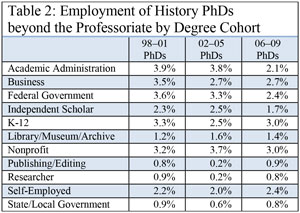 The proportion of history PhDs in academic administration positions without faculty appointments was higher among earlier graduates. In interviews for previous studies, a few history PhDs described growing weary with the “grind” of classwork, but still wanting to stay in academia, and so choosing to take up administrative posts instead. That may be behind the small differences evident among the three cohorts: 2.1 percent among those who graduated three to seven years ago compared to 3.9 percent of the earliest cohort.
The proportion of history PhDs in academic administration positions without faculty appointments was higher among earlier graduates. In interviews for previous studies, a few history PhDs described growing weary with the “grind” of classwork, but still wanting to stay in academia, and so choosing to take up administrative posts instead. That may be behind the small differences evident among the three cohorts: 2.1 percent among those who graduated three to seven years ago compared to 3.9 percent of the earliest cohort.
A significant portion of faculty members in the recent cohort now employed off the tenure track will likely shift into other employment sectors over time, thereby more closely resembling the employment pattern of the earlier cohort. Variation in the proportion of history PhDs off the tenure track was evident across the three groupings in our snapshot, data that accords with the 2004 National Survey of Postsecondary Faculty and the AHA’s surveys of job advertisers, which show a significant drop in hires to tenure-track jobs five years after completion of the PhD.6
Field Specializations Mark Significant Differences
A closer look at employment patterns across field specializations reveals striking differences in the employment prospects of students in different fields. Specialists in the history of North America comprised slightly over half of all PhDs conferred during the period under study, but made up only 41.0 percent of the departmental faculty listed in the AHA’s directory of history departments.7 Given the difference between the distribution of history PhDs and the composition of departments, it is not surprising that a much smaller proportion of specialists in North American history (only 43.9 percent) were found in tenure-track positions at four-year colleges and universities (Figure 3).
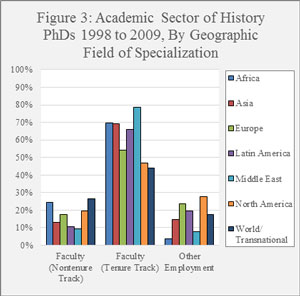 In comparison, 51.8 percent of PhDs specializing in European history, and 65.0 percent or more of specialists in the histories of Africa, Asia, Latin America, or the Middle East and Islamic world found tenure-track employment in four-year institutions. The only field with proportions similar to North American history was world history, with 44.1 percent of PhD recipients holding tenure-track posts.
In comparison, 51.8 percent of PhDs specializing in European history, and 65.0 percent or more of specialists in the histories of Africa, Asia, Latin America, or the Middle East and Islamic world found tenure-track employment in four-year institutions. The only field with proportions similar to North American history was world history, with 44.1 percent of PhD recipients holding tenure-track posts.
Given the sharply lower proportions in tenure-track positions, it will come as no surprise that commensurately larger segments of specialists in North American and world history hold non-tenure-track posts (19.4 percent and 26.5 percent, respectively). But within the sample frame, we also found a large segment of PhDs in African (24.5 percent) and European history (17.4 percent) employed in non-tenure-track positions.
While specialists in North American history were significantly less likely to be on the tenure track than were specialists in other fields, they were more likely to be employed in public history positions. Almost 10 percent of the Americanists in our sample (127 of 1,296) held positions allowing them to make direct use of their historical training. In comparison, only 4.1 percent of the specialists in other fields held public history jobs, ranging from 5.9 percent of world historians and 4.6 percent of European history specialists, down to none of the sample’s Africanists.
Viewed across the three cohorts, trends among particular fields follow the same pattern as the averages for all PhDs—with the proportion of those finding working in tenure-track positions clustered around the mean for their particular subject fields, and highest among those who earned their PhDs between 2002 and 2005. Among the specialists in Latin American history, for instance, 69.8 percent of PhDs from the 1999 to 2001 cohort held four-year tenure track positions, compared with 73.3 percent of PhDs from the middle cohort, and 52.9 percent of the 2006 to 2009 cohort.
Key Differences between Programs
While the selection of a subject for study correlated with a significant difference in the PhDs’ career outcomes, their choice of programs also correlated with substantially different occupational paths in the years after graduation. The rankings of history PhD programs are properly viewed with suspicion, since it is not clear what rankings truly measure—the type of students that programs admit and support, the quality of their preparation of graduate students, the productivity of their faculty, or simply the name recognition of a few departmental stars. Regardless of what they actually measure, our study found that the most recent rankings of history PhD programs from the National Research Council (NRC) correlate to outcomes on the academic job market.8
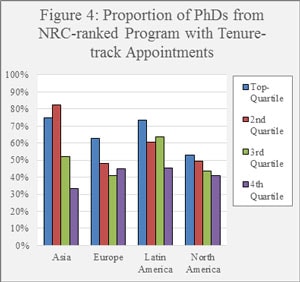 The program conferring a degree made a significant difference in the academic career opportunities of its students. We found 59.1 percent of the graduates from universities in the top quartile of the National Research Council’s 2007 rankings held positions on the tenure track, as compared to 57.8 percent of graduates from the second tier, and 41.9 percent from the third tier and below. The differences can be seen across the four largest subject fields, with tenure track employment about one-third lower among graduates from institutions in the bottom quartile (Figure 4).
The program conferring a degree made a significant difference in the academic career opportunities of its students. We found 59.1 percent of the graduates from universities in the top quartile of the National Research Council’s 2007 rankings held positions on the tenure track, as compared to 57.8 percent of graduates from the second tier, and 41.9 percent from the third tier and below. The differences can be seen across the four largest subject fields, with tenure track employment about one-third lower among graduates from institutions in the bottom quartile (Figure 4).
The quartiles’ broad averages can be deceptive. The top five schools in the NRC rankings all had placement rates onto the tenure track of around 75 percent. Conversely, all of the students from three of the sample’s smaller, lower-rated institutions (accounting for 26 students) were found on the tenure track. In the end, our findings suggest that a wide variety of variables come into play in the match between a specific candidate and the available jobs in any given year (or years) on the job market. Earning a PhD from a particular institution or in particular field of specialization neither guarantees success nor proves an insurmountable barrier to securing a tenured faculty position.
A significant difference between the top tier and the rest lies in the proportion of PhDs working off the tenure track at four-year colleges and universities. While 13.1 percent of PhDs from top-tier programs were teaching in two-year programs or employed in non-tenure-track positions at four-year institutions, over 20 percent of the PhDs from institutions at the other ranks were similarly employed (Figure 5).
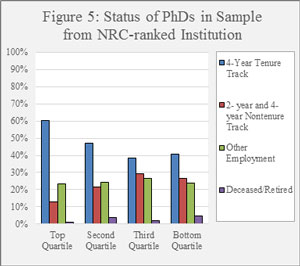 The proportion of PhDs employed in non-faculty positions remained relatively consistent across the rankings at around 25 percent of students from each quartile. PhDs from top-ranked institutions were almost twice as likely to be employed in business as were those from other programs, while graduates from lower-ranked programs were more likely to be employed in government at the local, state, or federal level. Students from the lowest-ranked programs were also much more likely to be self-employed or independent researchers.
The proportion of PhDs employed in non-faculty positions remained relatively consistent across the rankings at around 25 percent of students from each quartile. PhDs from top-ranked institutions were almost twice as likely to be employed in business as were those from other programs, while graduates from lower-ranked programs were more likely to be employed in government at the local, state, or federal level. Students from the lowest-ranked programs were also much more likely to be self-employed or independent researchers.
Part of the difference between quartiles may be attributable to the types of students who complete different programs. A much larger proportion of PhDs from the lower-ranked programs were retired—nearly four times the proportion of PhDs from the top programs—suggesting that top-tier programs housed significantly younger populations, on average, than the others.
The perceived quality of a program made a modest difference among field specializations. For instance, 54.0 percent of the specialists in North American history from top-quartile departments had tenure-track positions, more than 10 percentage points higher than the placement from programs in the bottom of the rankings (43.3 percent).
Across most other subject fields, PhDs from programs in the ranking’s top quartile were significantly more likely to have tenure-track jobs at four-year institutions than their counterparts from institutions in the ranking’s bottom half—a difference of almost 75 percent among specialists in Asian and European history. The gap between the top- and bottom-ranked institutions in the proportion of their PhDs with jobs on the tenure track was less than 30 percent for specialists in Latin American, African, and Middle East history.
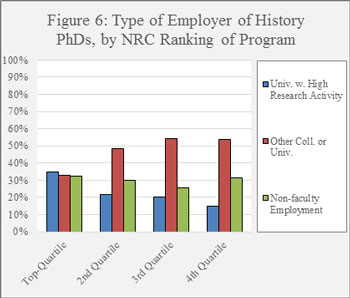 The program conferring the degree also made a difference in the types of academic institutions in which history PhDs found employment—raising important questions about the varieties of career preparation students should receive. PhDs are prepared primarily for jobs with a heavy research component, even though academic institutions may have widely varying expectations about the proper balance between publication and teaching.9 Our findings show that graduates of top-ranked programs were far more likely to be working at a research university (Figure 6). While 34 percent of the students from top-ranked programs (just over half of those working in academia) found employment at institutions characterized by the Carnegie Foundation as supporting “high levels of research activity,” less than 21 percent of the history PhDs from other programs had positions at research-intensive institutions.
The program conferring the degree also made a difference in the types of academic institutions in which history PhDs found employment—raising important questions about the varieties of career preparation students should receive. PhDs are prepared primarily for jobs with a heavy research component, even though academic institutions may have widely varying expectations about the proper balance between publication and teaching.9 Our findings show that graduates of top-ranked programs were far more likely to be working at a research university (Figure 6). While 34 percent of the students from top-ranked programs (just over half of those working in academia) found employment at institutions characterized by the Carnegie Foundation as supporting “high levels of research activity,” less than 21 percent of the history PhDs from other programs had positions at research-intensive institutions.
Patterns by Gender and by Mobility
Gender
In comparison to wide differences marked by field and program, comparatively little variation exists in the employment patterns of men and women. A slightly larger proportion of women in the sample held tenure track employment at four-year institutions (50.0 percent for men as compared to 51.9 percent for women), and a slightly larger proportion of men occupied faculty jobs at two-year institutions or off the tenure track (21.6 percent as compared to 18.1 percent) (Figure 7).10
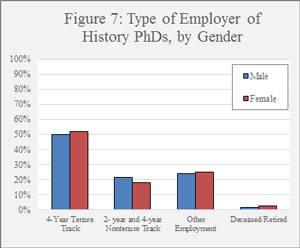 Women in the sample were slightly more likely to be employed outside of faculty positions (25.0 percent of the women and 23.9 percent of the men). We found only a few significant differences in the employment patterns of men and women who found employment. The proportion employed as K–12 teachers, for instance, was nearly identical (2.8 percent of women compared to 3.0 percent of men). Likewise, little difference emerged in the proportion employed at nonprofits (3.6 percent of women compared to 3.2 percent of men).
Women in the sample were slightly more likely to be employed outside of faculty positions (25.0 percent of the women and 23.9 percent of the men). We found only a few significant differences in the employment patterns of men and women who found employment. The proportion employed as K–12 teachers, for instance, was nearly identical (2.8 percent of women compared to 3.0 percent of men). Likewise, little difference emerged in the proportion employed at nonprofits (3.6 percent of women compared to 3.2 percent of men).
Notable differences surfaced in five categories. Men were twice as likely to work for the federal government (4.1 percent as compared to 1.8 percent in the sample), and slightly more likely to be employed in for-profit business (3.5 percent compared to 2.4 percent) or state and local governments (1.0 percent compared to 0.4 percent). Conversely, we found a greater percentage of women employed as either independent scholars (3.6 percent compared to 1.2 percent) or in some other self-employed capacity (2.7 percent compared with 1.9 percent).
The differences between genders looked a bit more pronounced among those who graduated in the same area of specialization (Table 3, PDF). The percentage of men and women working in tenure-track faculty positions at four-year institutions was similar for the fields of Latin American (65.6 percent of women and 65.3 percent of men), North American (44.4 percent of women and 43.7 percent of men), and African history (64.7 percent of women compared to 66.7 percent of men). But we found greater disparities in the tenure-track status of those who studied the history of the Middle East (75 percent of women and 82.5 percent of men), world (40.0 percent of women and 47.4 percent of men), and Europe (55.7 percent of women and 49.1 percent of men).
Mobility and the Academic Job Market
Alongside the variables of field specialization and institution, prospective graduate students should also consider their potential mobility after completing their degree. Given the often uneven distribution of jobs in any given subject area, an applicant’s ability to move to a new location can play a crucial role in his or her success on the job market. Almost half of the PhDs with faculty or administrative positions (45.7 percent) were employed in the same region as the school that had conferred their degree, and much of the movement that did occur was to an adjacent region.11 But a substantial difference arose between faculty on the tenure track, and faculty in non-tenure-track or administrative positions. Most faculty members in non-tenure-track or administrative positions were employed in the same region in which they had earned their PhD (61.1 percent), nearly twice the proportion of those employed in tenured or tenure-track positions (Figure 8).
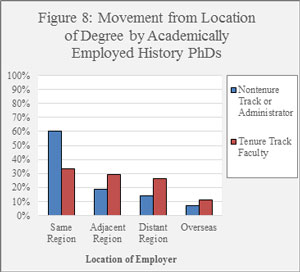 Graduates from the top-ranked programs appeared significantly more mobile than PhD recipients from other programs. While 22.0 percent overall of the PhDs holding academic appointments were still in the same region as their degrees, nearly a third of PhDs from the second tier, and just over 40 percent of students from other programs, remained nearby.
Graduates from the top-ranked programs appeared significantly more mobile than PhD recipients from other programs. While 22.0 percent overall of the PhDs holding academic appointments were still in the same region as their degrees, nearly a third of PhDs from the second tier, and just over 40 percent of students from other programs, remained nearby.
Specialists in North American history showed less inclination to move than did their counterparts in other geographic specialties; 50.1 percent remained in the same region as their degree. Among all other subject areas, only 32.4 percent had not moved out of the region of their degree.
Part of the difference reflected proximity to a large number of other academic institutions. Graduates from programs in the less populous regions of the Rocky Mountains and Southwest demonstrated higher levels of mobility than the average, but also had placement rates into tenure-track employment nearly 10 percent lower than the average for other regions.
Program rankings made a difference in the type of geographic destination as well. Among history PhDs from the top quartile of programs who worked as faculty, 42.1 percent found employment in large or mid-size cities, while 30.8 percent of the academically employed students from programs in the lower half of the rankings were similarly situated. Thus, willingness to relocate to small towns and other rural locations could factor into one’s success on the job market.
Conclusion
The findings in this survey should provide useful takeaways for everyone with a role to play in the academic system. For prospective graduate students—particularly those looking toward faculty careers—we hope this study sheds light on the odds for making it into the job of your dreams, and variables that may factor into the outcome. Students interested in careers beyond the professoriate should recognize the versatility of a history education and know that they, too, can leverage their PhD into a meaningful career outside the academy.
For doctoral programs, we hope the results will help to clarify their roles in the ecology of the history profession, indicating the range of careers for which they should be preparing students. As the AHA’s Committee on Graduate Education (CGE) observed a decade ago, “Graduate students want a more complex education than most PhD programs are offering.”12 While the survey cannot tell us whether programs revised their curriculum to address concerns expressed by the CGE, the results demonstrate a diverse array of career outcomes for their graduates.
The research for this study can only assess where a specific cohort of PhDs were at a specific moment in time. While we can separate out certain characteristics that a particular segment of history graduates might have in common, further study is needed to assess the specific life choices that led the PhDs in our study from their degree to their current occupation. We cannot resolve many of the crucial push and pull factors shaping each career trajectory to this point—from the initial selection of a university and program of study on through the tribulations of an often-hazardous job market. One of the more interesting questions is how many of the history PhDs who aspired to academic jobs found them, and what became of those looking toward nonacademic jobs. We encourage the American Historical Association to work on follow-up surveys with PhDs from this cohort, which could explore these and other factors in their careers.
About the Authors
L. Maren Wood earned a PhD in history from the University of North Carolina at Chapel Hill. She is the founder and lead researcher of Lilli Research Group, a small education-consulting firm.
Robert B. Townsend is the former deputy director of the American Historical Association, and author of History’s Babel: Scholarship, Professionalization, and the Historical Enterprise in the United States, 1880–1940 (University of Chicago Press, 2013).
Additional assistance in the development of the data and this report was provided by Julia Brookins, Carolyn Fuqua, Allen Mikaelian, and Liz Townsend.
Notes
- Research for this study was funded by a grant from the Andrew W. Mellon Foundation. [↩]
- See for instance Chris M. Golde, “The Career Goals of History Doctoral Students: Data from the Survey on Doctoral Education and Career Preparation,” Perspectives on History (October 2001), which studied doctoral students enrolled in 1999, and found 70.4 percent “definitely interested in a faculty career.” Similar numbers can be found in annual results from the Survey of Earned Doctorates for the PhD recipients used in this sample (see the annual reports). [↩]
- Linda Ingram and Prudence Brown, Humanities Doctorates in the United States: 1995 Profile (Washington, DC: National Academies Press, 1997). Note that the survey on which this information is based encompasses a much larger population of history PhDs and relied on self-reported data, instead of a search for current employment and assignment into a particular category. [↩]
- Robert B. Townsend, “Underpaid and Underappreciated: A Portrait of Part-time Faculty,” Perspectives on History (September 2012). We assigned each of the PhDs in the sample to the position that seemed their primary source of income. [↩]
- For the purpose of this classification, we counted those employed outside of academia whose primary job responsibility involved historical research, writing, or dissemination. For more on the definitional challenges of public history, see John Dichtl and Robert B. Townsend, “A Picture of Public History: Preliminary Results from the 2008 Survey of Public History Professionals,” NCPH Newsletter (September 2009). [↩]
- In the 2004 National Survey of Postsecondary Faculty, the proportion of part-time faculty in history who had earned their degree within the previous four years was twice as high as the proportion of full-time faculty with degrees over that span. Data tabulated using the Department of Education’s DAS Online system. On the results of past surveys of advertisers, see Robert B. Townsend, “The PhD Gap: Worrisome Trends in the Hiring of Junior Faculty,” AHA Today. [↩]
- See Robert B. Townsend, “Decline of the West or the Rise of the Rest? Data from 2010 Shows Rebalancing of Field Coverage in Departments,” Perspectives on History (September 2011). [↩]
- For this study, we used the R rankings in Jeremiah P. Ostriker, Charlotte V. Kuh, and James A. Voytuk, eds., A Data-Based Assessment of Research-Doctorate Programs in the United States (Washington, DC: National Academies Press, 2011), broken out into four quartile groups. Unranked programs tabulated separately, but averaged with programs in the bottom half of the rankings where appropriate. [↩]
- On the primacy of publication in the preparation of history PhDs, see Thomas Bender et al., The Education of Historians for the 21st Century (Urbana: University of Illinois Press, 2004), which “found that graduate departments rank preparing students for research as their most important educational task.” On the differential expectations for faculty among particular institutions types, see Robert B. Townsend, “What Makes a Successful Academic Career in History? A Field Report from the Higher Ranks,” Perspectives on History (December 2012). [↩]
- Our sample included 969 women (38.7 percent) and 1,523 men (60.9 percent) with 8 unknown. This gender breakdown is consistent with data the AHA collected on the number of women who earned degrees during the years examined in this study; see Robert B. Townsend, “A Profile of the History Profession, 2010,” Perspectives on History (October 2010). [↩]
- For this survey, we used the eight geographic regions—New England, Mid East (Mid Atlantic), Southeast, Plains, Great Lakes, Southwest, Rocky Mountains, Far West—in the IPEDS institutional characteristics database. Since we relied on the IPEDS data for assignments, we do not have comparable data for the 24 percent not employed at academic institutions. [↩]
- Bender et al., Education of Historians, 20. [↩]
Related Resources

August 25, 2023
Resources for Public Historians

January 7, 2023
